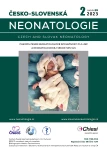-
Medical journals
- Career
Non-invasive pulmonary ventilation of newborns in CPAP and HFNC mode
Authors: TA. Nguyen
Authors‘ workplace: Klinika gynekologie, porodnictví a neonatologie, 1. LF UK a VFN, Praha
Published in: Čes-slov Neonat 2023; 29 (2): 102-107.
Category: Contributions on respiratory problems of preterm newborns
Overview
This text is a commentary on the European consensus guidelines on the management respiratory distress syndrome. Respiratory support with continuous positive airway pressure or non-invasive ventilation in combination with an individualized indication for surfactant administration is currently the method of choice for newborns with respiratory distress syndrome. The level of support should be titrated according to the clinical response with respect to the gestational age and the pathophysiology of the respiratory system. Non-invasive ventilation, especially synchronized, has the potential to protect patients from both primary intubation and post-extubation failure. The latest mode of non-invasive ventilation is neurally adjusted ventilatory assist which enables precise synchronization and proportionality of delivered pressures. High-flow nasal cannula is gaining popularity and may be appropriate in the treatment of preterm infants, provided there is an option to escalate treatment.
Keywords:
premature newborn, respiratory distress syndrome, non-invasive ventilation
Labels
Neonatology Neonatal Nurse
Article was published inCzech and Slovak Neonatology

2023 Issue 2-
All articles in this issue
- PREFACE
- EDITORIAL
- Standardized procedure for stabilization and resuscitation of premature newborns
- Graded target saturation according to post-menstrual age
- Surfactant treatment
- Non-invasive pulmonary ventilation of newborns in CPAP and HFNC mode
- Basic principles of mechanical ventilation in immature newborns and used ventilation modes
- Systems for automatic oxygen dosing during artificial lung ventilation
- Outpatient care of infants with severe lung disease arising in the perinatal period
- Respiratory failure and ECMO in neonates
- A growing number of term newborns rehospitalizations and possible risks
- Pokyny pro autory
- Czech and Slovak Neonatology
- Journal archive
- Current issue
- Online only
- About the journal
Most read in this issue- Non-invasive pulmonary ventilation of newborns in CPAP and HFNC mode
- Surfactant treatment
- Standardized procedure for stabilization and resuscitation of premature newborns
- Respiratory failure and ECMO in neonates
Login#ADS_BOTTOM_SCRIPTS#Forgotten passwordEnter the email address that you registered with. We will send you instructions on how to set a new password.
- Career

